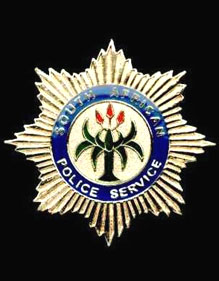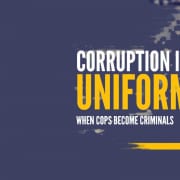|
Getting your Trinity Audio player ready...
|
 Back in September 2012, when Corruption Watch had only been existence for a few months, the organisation expressed concerns over the lack of attention to fraud and corruption-related crimes in the annual crime statistics released by the ministry of police. There was simply no breakdown of information relating to these crimes, despite numerous warnings from government oversight bodies that the country was losing billions annually to public service corruption.
Back in September 2012, when Corruption Watch had only been existence for a few months, the organisation expressed concerns over the lack of attention to fraud and corruption-related crimes in the annual crime statistics released by the ministry of police. There was simply no breakdown of information relating to these crimes, despite numerous warnings from government oversight bodies that the country was losing billions annually to public service corruption.
Some things have changed since 2012: Bheki Cele is no longer the national police commissioner and earlier this year Nathi Nhleko took over from Nathi Mthethwa as police minister. What has not changed in the slightest, however, is Corruption Watch’s position on the lack of data dedicated specifically to the two types of crimes.
Said Corruption Watch executive director David Lewis in reaction to the 2012/13 statistics: "While we understand that corruption is difficult to measure, it is a serious crime and widely perceived to be rapidly increasing.
“In fact, the Prevention and Combatting of Corruption Activities Act of 2004 clearly lays out a definition of corruption and the steps to be taken when corruption is suspected or proven.”
The country’s latest crime data was released on 19 September by Nhleko and current national police commissioner Riah Phiyega. The pair faced a barrage of questions from journalists who questioned piece after piece of information given on the crime status of the country. The “commercial crimes” category, a mixed bag of crime types under which fraud and corruption fall, had gone down from over 90 000 reported cases in the 2013 report, to just under 80 000 in the past year. In terms of the crime stats, this is an area that does not attract as much media attention as the violent crimes
The number of reported commercial crimes came down in all the provinces, with the exception of the Northern Cape, which saw a rise. No further breakdown is given by the South African Police Service (SAPS).
Although oversight bodies exist under the Chapter 9 section of the Constitution, and while their work normally goes as far as monitoring and recording the extent of corruption or undue expenditure of public money, their powers extend only towards recommendations for remedial measures and they are restricted from prosecuting wanting officials. Corruption cases are therefore probed by the SAPS, with the Hawks and the Special Investigations Unit stepping in for the serious ones.
Lawlessness shown in the small things
If the 7 000-plus reports of corruption in Corruption Watch’s possession are anything to go by, this type of crime continues on an upward movement – across the country – affecting ordinary citizens on a great scale. Basic service delivery is compromised when public or elected officials steal from the state. Public sector corruption, in particular, remains a worrying factor – this is documented by sector watchdogs such as the public protector and auditor-general.
The Institute for Security Studies, in response to the latest crime stats, says South Africans’ attitudes towards the law are demonstrated in small things. Examples of this are the high number of people who drive without seatbelts, using their mobile phones or under the influence of drugs or alcohol, and police officers who break traffic rules among others.
“It is difficult to slow this steady erosion of the law when respect for and confidence in the institutions of state, including the police, are undermined by the daily experience of citizens in their interactions with the criminal justice system,” reads the article.
“Perhaps even more significantly, attempts to change attitudes towards the rule of law are stymied by the disrespect demonstrated for the law and the value of life by the very people responsible for making and enforcing the law.
“For as long as those holding political office appear to act with impunity, or cynically use the criminal justice system to dodge very serious allegations of the abuse of power and state resources, we cannot reasonably expect South African citizens to respect the law.”
Police are no angels
In his last budget speech as minister, Mthethwa conceded that the police service is in itself shrouded in dishonest practices that undermine efforts to combat fraud and corruption. “…in 2008 with anyone and everyone being scooped into the service and the reservists, we were left with masses of poorly trained, poorly managed officers, sometimes with criminal records, and of course no internal anti-corruption unit…”
The police’s capacity, it appears, is limited in terms of investigating corruption-related crimes that result in prosecutions. Lack of trust in the system also hampers reporting from members of the public. This begs the question, will South Africans ever know how much of the commercial crimes space is taken up by public sector corruption?
A survey by legal firm ENS Africa, released earlier in the year, revealed that many companies across Africa – in South Africa too – are better positioned to deal with anti-corruption regulators than they are to actually curb the crime.
Bribery, said ENS, remains the most prevalent form of corruption worrying companies across the continent, and only 19% of companies surveyed admitted that they have never conducted an anti-bribery risk assessment.
Those that do have anti-bribery programmes have greater success in avoiding the crime than their more lax counterparts, but exposure to it is high and in many cases the support of top management is lacking, which makes things more difficult.
The Organisation for Economic Co-operation and Development (OECD) provides a broader perspective of South Africa’s slack attitude towards curbing foreign bribery. The country signed a convention seven years ago, essentially committing itself to the fight against the crime, which is growing in proportion to the expansion of local companies into the global market.
According to the OECD, “the need for enforcement is imperative, especially as South African companies are increasingly operating abroad, often in sectors with a high risk of foreign bribery. There are also serious concerns that prosecutions may be hampered by political and economic considerations.”
Corruption Watch is of the opinion that the public dissemination of crime figures is useful because it shows transparency and accountability in the police department, and also because knowledge of crime trends and the extent of different types of crime is important in enabling communities to develop interventions. This could even ease the burden on the police force.









